News

EMA calls for enforcement of COVID-19 safety amidst re-start of events
The EMA’s Handbook, lists out detailed safety and hygiene standards and protocols to ensure that all future events will be hosted in a responsible manner - minimizing the risk of COVID-19 transmission at events in order to avoid further shutdowns of an industry that is already on the verge of collapse after 14 months of closure.
The EMA represents the interests of an array of business segments, from event management companies, wedding planners, equipment rental companies (sound systems, lighting, LED, etc.) stage & set fabricators, furniture & infrastructure rental companies, and digital creatives companies to venues, florists, musicians, event support services, entertainers, dance troupes, artists, designers, technicians and many more. In total, the entire sector is estimated to contribute as much as Rs. 30 billion towards the national economy.
“We express our collective gratitude to the Government for taking a positive decision that will allow our members to earn a living after several painful months. While we welcome the opportunity for events to be hosted once more, extremely strict enforcement of comprehensive safety protocols is essential to avoid transmission of COVID-19 at events," Roshan Wijeyaratne, President, EMA stated.
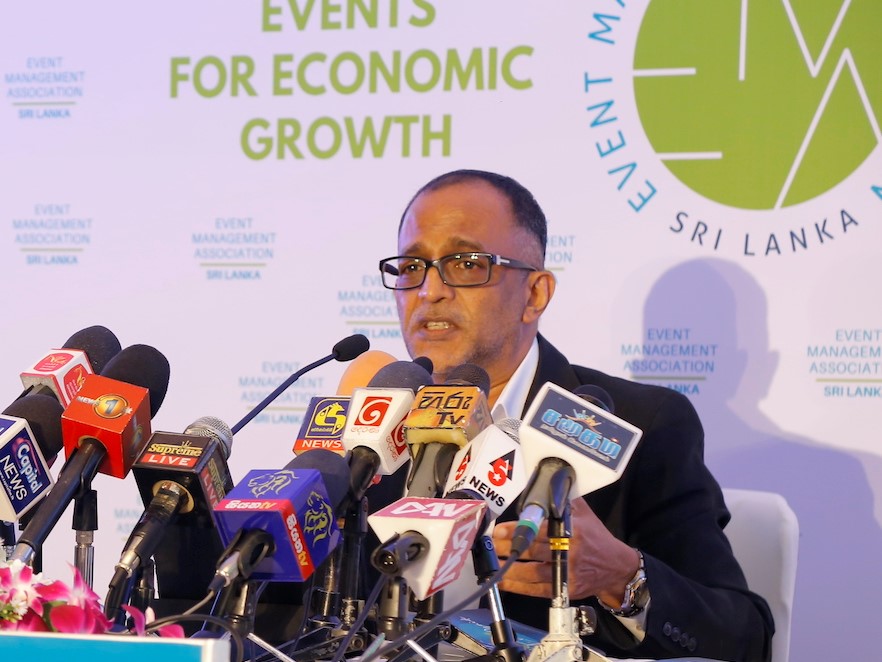
“Many event companies have made massive investments into infrastructure, equipment, and development of skills with investments ranging from Rs. 10 Mn to Rs. 800 Mn per business. They are now on the brink of collapse and are struggling to pay wages and meet financial commitments. Without assistance, they face impending bankruptcy. This will affect 130,000 direct and 600,000 indirect jobs and the people and families who depend on our industry for their livelihood,” Sajith Kodikara, Vice President, EMA.
Events are considered essential to businesses as a vital tool of ‘live communication’ which enables a cross-section of industries to present new products to the market and generate sales. In that regard, a high frequency of corporate events is often correlated with a healthy economy.
For countries that are beginning to emerge from COVID-19, face-to-face meetings and events are a priority feature of work they are looking to restart. A study of 125 New Zealand-based organisations found that 97% are planning to hold a business event in 2021 – up from 94% of respondents to a survey conducted in May 2020 . Another recent study found that business travel has increased by 55% since restrictions eased while 37% of respondents expect to resume travel in 2021.
“Another crucial factor to consider is the potential for Sri Lanka to be positioned as a ‘safe event hub’ for MICE and destination event tourism which will accelerate Sri Lanka’s economic revival. That is provided we are able to get the health crisis under control with a scientific approach and a sustainable way forward for the industry. If we delay, we will most certainly lose out on business to other countries in the region,” Nishan Wasalathanthri, Treasurer Member, EMA.
In emulation of global best-practices adopted as a solution to ensure compliance of guidelines, the EMA Handbook proposes the appointment of ‘safe-event ambassadors’ tasked with reporting on non-compliance of guidelines.
“The handbook is created to simplify the organisers’ tasks of planning and hosting events and to mitigate the risk of weaker standards being applied. While the guidelines are already comprehensive, we expect to update it with additional information shortly,” Minha Akram, Committee Member, EMA added.
The Association also expressed its support for the Government’s efforts to control the pandemic and re-start the Sri Lankan economy.
“As with many sectors of the economy today, our industry is in dire peril. There is however a light at the end of the tunnel, in the form of mass vaccination. We take great encouragement from the Government’s emphasis and continuing rollout of vaccines to the public and request the prioritization of vaccines for industry members.
“In order for all sectors of the economy to scale up activity, and have a meaningful chance at recovery, we need to achieve 60% vaccination as soon as possible. Only then will we be able to see larger scale events take place. We also take this opportunity to urge the public to continue cooperating with public health measures to speed our progress to recovery,” Gerry Jayasinghe, Advisory Counsel, EMA said.
The EMA handbook will be available online on www.emalk.org from 19 July 2021.
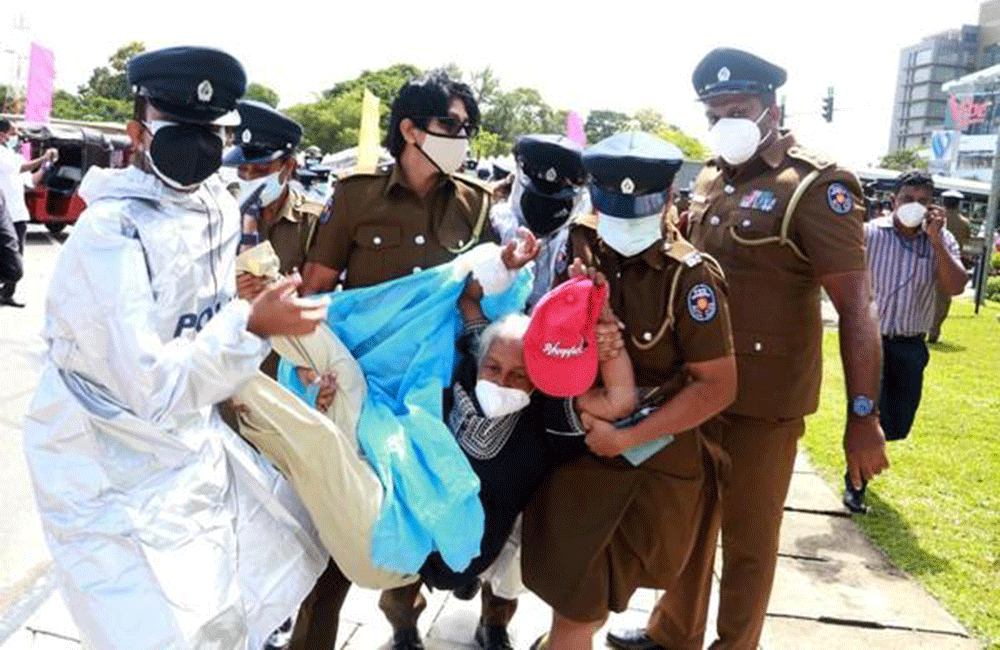
BASL writes to IGP, DG Health : 'Quarantine should not be used as a punishment'
The Bar Association of Sri Lanka (BASL) has expressed grave concern over the spate of arrests and quarantine of peaceful protesters by the Sri Lanka Police. In a letter to the Director General of Health Services, Dr. Asela Gunawardena and Inspector General of Police (IGP) Chandana D. Wickramaratne, the BASL has stressed that authorities should not use quarantine as a punishment or mode of detention.
The BASL noted that the acts of forced detention in quarantine centres are arbitrary and unlawful, and are an affront to the judiciary that have released the said persons on bail.
Highlighting the excessive force used by the Police in dealing with the protestors, the BASL has expressed its concern with regard to the use of excessive force by the Police on numerous occasions previously.
Furthermore, BASL alleged that the health guidelines issued by the Health Services Director-General have not listed public protests or outdoor meetings as prohibited activities.
During the past few days the Sri Lanka Police has carried out a number of arrests of persons engaged in peaceful protests on different issues and produced them before courts of law.
Public protests straddle three important Fundamental Rights in the Constitution namely the Freedom of Speech and Expression, the Freedom of Peaceful Assembly and the Freedom of Association guaranteed by Articles 14(1)(a), (b) and (c) of the Constitution. Public protests also strengthen the Freedom of Thought which is entrenched as a fundamental Right by Article 10 of the Constitution. The rights under Article 14(1) may be restricted by law in the interests of public health, however, such restriction must be done by law, must have a nexus to the objective sought to be achieved and must be reasonable. The BASL has carefully perused the Health Guidelines issued by the Director General of Health Services. The said Guidelines permit several indoor and outdoor activities. These include inter on of spas, supermarkets and restaurants. They also allow the opening of liquor shops and also permit exercise and jogging outdoors. The said Guidelines have not listed public protests or outdoor meetings as prohibited activities
However, by the said Press Release issued by the Police Media Division the media has been informed that the Inspector General of Police has received a communication from the Director General Health Services that public meetings and protests involving mass gatherings should not be permitted due to the risk of the spread of COVID-19. It is noted that the even the contents of the said Press Release do not contemplate a total prohibition of meetings and protests but only seeks to prevent meetings and protests involving a mass gathering of people (මහජනතාව විශාල වශයෙන් ඒකරාශී වන). As such, meetings and protests which are carried out in compliance with Health Guidelines are not prohibited.
The BASL is firmly of the view that any organized protests should be carried out in a manner that it does not pose a risk to public health and that persons who intend to participate in protests or marches or similar exercises must ensure that they conform to health guidelines in their own interest and in the interests of the general public. However, at a time the Director General of Health Services has thought it fit to ease restrictions previously imposed, the BASL sees no reasonable cause whatsoever for the Police to act in a heavy-handed manner when dealing with protesters
In certain instances, after such protesters are released on bail by the Magistrates before whom they were produced, they have been taken away against their will to quarantine centres by Police officers, sometimes without even informing them or their families of where they were being taken.
The BASL has taken note of several instances and is deeply concerned as to how Individuals after having been granted bail have been forcibly seized from the precincts of the courthouses and sent to quarantine against their will. There is scant evidence that such decisions were based on the advice of health officials such as Public Health Inspectors. Compounding these concerns are the fact that by now even persons infected with COVID-19 and their first contacts are being quarantined at their respective homes or hotel, rather than being taken to Quarantine Centres.
Your attention is drawn to the Regulations made by the Hon. Minister of Health published in Gazette Extraordinary No. 2197/25 dated October 15, 2020 which is applicable to COVID-19. In terms of Regulation 91 of the said Regulations:
"it shall be lawful for the proper authority in any diseased locality in relation to the Coronavirus Disease 2019 (COVID-19) to - (a) restrict the movement of persons; (b) take or require any person to take a diseased person or a person suspected to be diseased to a hospital, place of observation or quarantine centre for treatment or quarantine purpose; or (c)direct any person suspected to be a diseased to be self-quarantined in his house, premises or place of residence for a period not exceeding the incubation period as may be determined by the proper authority for the whole of Sri Lanka
As such quarantining has necessarily to relate to a person who has contracted the disease or is suspected to have contracted the disease and to no other. Clearly, quarantine is a health precaution and should not be used as a punishment or mode of detention.
The aforesaid acts of forced detention in quarantine centres are arbitrary and unlawful are an affront to the judiciary who have released the said persons on bail. Such arrests and forcible detentions have a negative effect on and undermine the genuine efforts being taken by the health authorities, the security forces and the police to combat COVID-19.
We therefore, request you as the Inspector General of Police to direct your officers to refrain from arresting and detaining persons who are exercising their peaceful right to protest. As you are aware the BASL wrote to you on 10-06-2021 on the subject "Police Media Release on Circulation of Fake News, Photographs, Videos causing Disunity, Hate and Obstructing the COVID-19 Program", to which we have had no reply as yet. The BASL is alarmed at the increasing threat posed to the rights of individuals by the Press Releases and Circulars issued by the Sri Lanka Police under the guise of controlling the spread of COVID-19.
We call upon you as the Director General of Health Services not to allow the Health Guidelines to be abused in a manner which has a chilling effect on the freedom to dissent and to ensure that Health Regulations and Guidelines are used only for the purpose they were promulgated for. I.e. to curb the spread of COVID-19.

Agreement with US firm poses a threat to country's national security - JVP
Addressing the press at the JVP Headquarters, he said that Cabinet approval had been obtained on Monday to hand over 40% shares of the Yugadanavi Power Plant to a US Company.
"The Treasury Secretary had signed an agreement with the New York-based gas-to-power developer New Fortress Energy to construct a new offshore LNG terminal," he disclosed.
Currently, its shares belong to the Treasury and four other state institutions.
The Kerawalapitiya Power Plant consists of 300 MW in operation today and is ultimately expected to grow to over 1,000 MW by 2025 according to this plan, Dissanayake said, adding the power plant will eventually become the largest in Sri Lanka and 40% stake is to be given to a US firm.
“This is the latest instance of the government selling off the country’s assets to super powers. This has become part of the foreign policy of the incumbent government. It sells off the assets to China, India and the US from time to time. The Colombo Port City Economic Commission Act which was recently passed in the Parliament has given a lot of power to a Chinese company and now there are discussions ongoing to hand over the oil tanks in Trincomalee and its Harbour to India," he added.

Key eyewitness of Welikada prison massacre receive death threats
Committee for Protecting Rights of Prisoners (CPRP) Chairman Senaka Perera said that on 7 July, two unidentified persons who visited Sudesh Nandimal De Silva’s residence at the Lakhiru Sewana apartment complex in Maligawatta had inquired from neighbours about De Silva’s movements. He further added that the unidentified persons had made statements which imply that they were planning to cause some kind of threat to De Silva’s life.
According to a statement to the media by Attorney at Law Perera, several unidentified persons had visited De Silva’s relatives’ houses in Mount Lavinia, where he lived around 15 years ago, and had inquired about him.
According to CPRP, a complaint has already been lodged with the police.
“On the same day (7 July 2021), a complaint was lodged with the Dematagoda police station under complaint number CIB 1/117/42. Two persons have given statements in connection with the incident.”
The CPRP Chairman further said that steps are being taken to hand over to the police the CCTV camera footage of the venue of the incident, to assist the ongoing police investigations.
CPRP stresses that prompt measures need to be taken to find out the identities of those attempting to harm De Silva’s life including those giving orders and ensure his safety.
In the press release, Perera further explained that De Silva had received various threats earlier for being a witness of the 2012 Welikada Prison massacre where inmates were murdered, and for being critical in public about the government’s unfair and unjust conduct. He added that a group of unidentified persons had earlier shot at De Silva’s sister’s house in Moratuwa where he resided temporarily.
De Silva, who is under threat, is the General Secretary of CPRP.
During the Welikada Prison massacre, which took place on 9 November 2012, armed members of the defence forces stormed into the Welikada Prison, and 27 inmates were killed while over 40 inmates sustained injuries.

Unreliable PCR tests? - China blacklists private hospital
The Chinese Embassy in Colombo has suspended Nawaloka hospital from its list of designated hospitals for PCR and IgM anti-body tests.
The Embassy said that several passengers from Sri Lanka holding the negative reports of PCR and IgM anti-body tests issued by Nawaloka hospital were diagnosed as COVID-19 patients after they entered China.
"In order to ensure the health and safety of all passengers to China, the Chinese Embassy in Sri Lanka will suspend Nawaloka hospital as the designated hospital for PCR and IgM anti-body tests and will not accept the reports of PCR and IgM anti-body tests issued by Nawaloka hospital from July 13, 2021," the Embassy said.
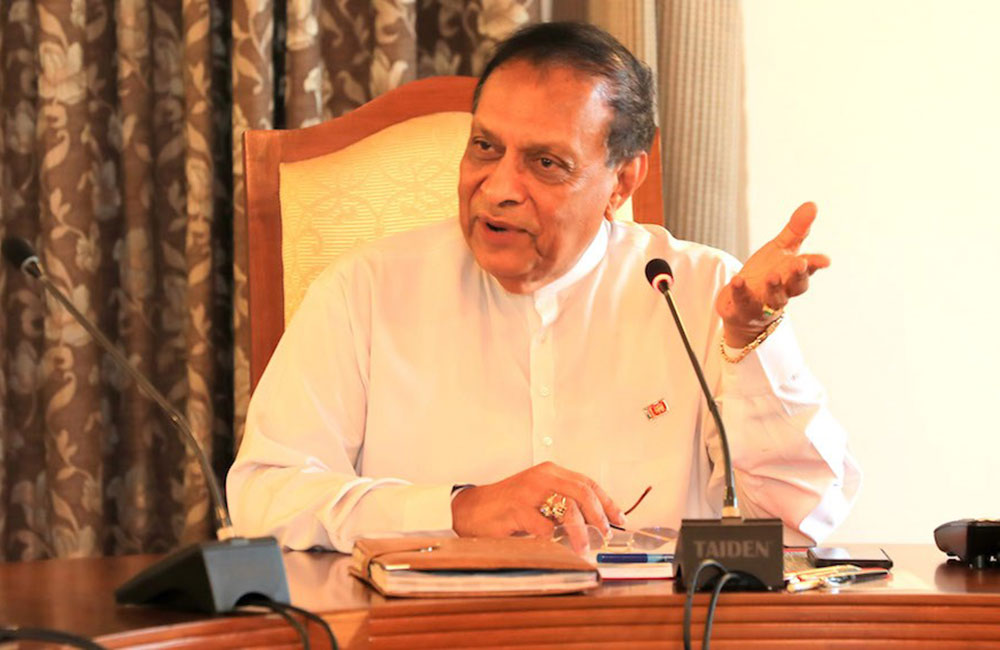
Karu condemns the government's attempt to suppress media
Former Speaker Karu Jayasuriya said that it was clear that a vicious course of action is being launched to harass, block, ban or destroy the Sirasa media organisation as revealed by the leader of the Opposition and the Leader of the Janatha Vimukthi Peramuna.
He said that if such a thing were to take place, then it would be considered as a vicious and criminal act against democracy.
In a statement issued by the National Movement for Social Justice, its chairman Karu Jayasuriya said:
"Our organisation is seriously concerned with the shameless preparations that are currently underway to destroy the democratic rights of the people based on the right to information and their freedom of speech. Therefore at this critical juncture, we urge all parties to come forward with determination to defeat any such attempt.
Media freedom is the right of the people of the country to express their views, the right to information and the right of journalists and media institutions to carry out their duties without fear or intimidation. This right was only taken away in the past by uncivilized regimes and by dictatorial, authoritarian rulers. But all those attempts were ultimately defeated by the civilized people around the world. Any powerful individual preparing to repress the media in this country must first understand that.
The National Movement for Social Justice emphasizes this point in the light of the very responsible revelations made by the Hon. Leader of the Opposition and the Leader of the Janatha Vimukthi Peramuna. They made those serious statements before the country's parliament.
Accordingly, it is clear that a vicious course of action is being launched to harass, block, ban or destroy the Sirasa Media organisation. If it happens, then it would be considered as a vicious and criminal act against democracy. This cannot be expected from a regime that has at least some respect for its people and democracy.
Why this situation frightens us is because the dark past of this country can never be forgotten. We have travelled past some very dark times. We have gone through an era where journalists have been brutally murdered in broad daylight.
We have a history where there were organised attempts to destroy Sirasa by setting up claymore mines at the organisation. The people should not forget the horrific attempts to destroy media institutions such as Siyatha, Sunday Leader and Lanka e News. The heinous acts of attacks on journalists are no secret to the world today.
If anyone tries to take our country back to such an era with such a terrifying past, it is the responsibility of the democratic forces in this country to defeat it at its inception. Accordingly, all democratic forces must unite now and forget all divisions.
At the same time, there is a growing tendency to arrest political activists who represent the issues and grievances of the people. We must also pay close attention to the arrests of political activists of the Janatha Vimukthi Peramuna and the Frontline Socialist Party. These incidents can be considered as vicious attempts to suppress the voice of the people by abusing the law of this country.
Accordingly, we call on the just people of this country and all democratic forces to come forward to drive out this terrifying darkness that is engulfing the country and to join hands unconditionally."
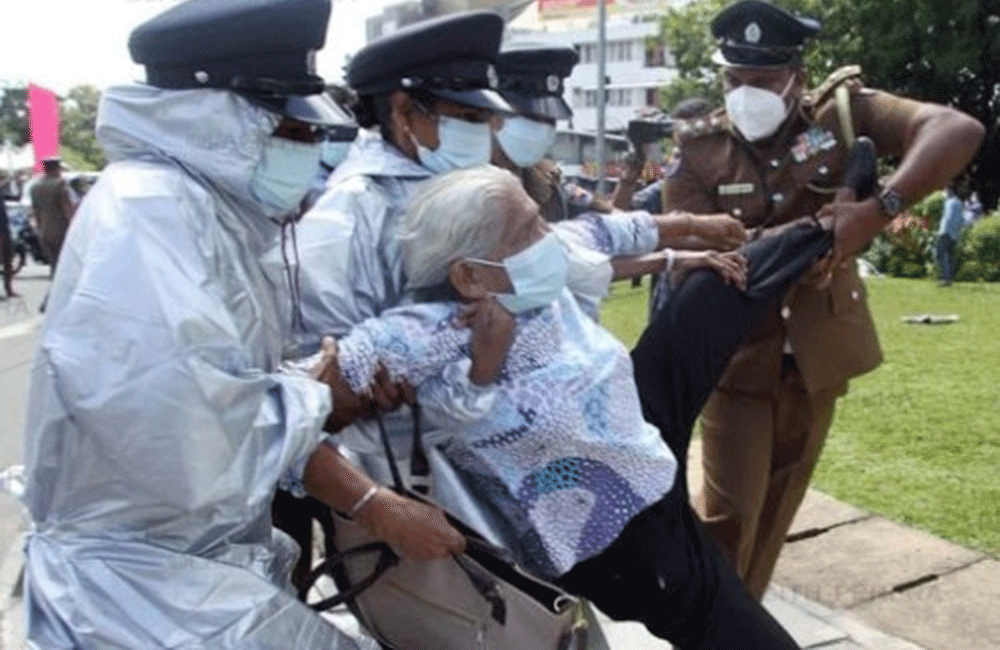
Teachers seek UN intervention against forced detention of protestors
The UN has been urged to intervene to save Sri Lanka from the dangerous situation it is in as a consequence of intensifying human rights violations committed by the growing military control in the country.
Ceylon Teachers’ Union (CTU) had written to the United Nations High Commissioner for Human Rights Michelle Bachelet, expressing concerns that oppression in the country has increased with the forcible detention of a number of activists including Joseph Stalin, who protested against the militarization of education.
“Through this letter, we requested the UN High Commissioner for Human Rights to intervene to ensure the people’s democratic right to expression, assembly, association and peaceful protest,” CTU Chairman Priyantha Fernando told journalists, after handing over the letter to the UN office in Colombo.
A group of activists who were arrested for staging a protest in Colombo against militarization of education were released on bail by the court on 8 July. However, subsequently, the police forcibly took them to an air force camp in the Mulliativu district where they are being detained at present.
Speaking in Parliament, former Prime Minister Ranil Wickremsinghe had warned that the steps taken by the government against Joseph Stalin would cause the loss of the GSP+ tax concession granted by the European Union.
Through the letter handed over to the UN, CTU had expressed fears of the second Rajapaksa-led government that came to power entrusting the country’s civil administration to the military and task forces that are not answerable to Parliament.
“The Covid-19 response and management also presided by a head of military resulted poor management of Covid-19 second and third waves in Sri Lanka and made lots of controversial decisions that resulted in the violation of rights of human rights defenders and minority community in Sri Lanka, including the decision to cremate the bodies of Covid-19 infected Muslim persons against their community’s will,” said the letter, signed by Priyantha Fernando and Vice Chairman Rasika Handapangoda.
CTU had expressed fear about the increasing number of military personnel deployed to work with the police and the recent use of excessive force against peaceful protesters.
“Considering growing concerns over shrinking space for dissent domestically, the CTU thinks international organization and diplomatic missions are the only platforms where Sri Lankan civil society has the possibility to engage openly in dialogue with the government and other States on human rights concerns in Sri Lanka, and even this space is increasingly under threat due to deepening risks of reprisals against Sri Lankan civil society actors who discuss the human rights situation with the international community. Those human right defenders are increasingly vilified as “traitors” in both mainstream and social media purposefully.”
CTU further requested the UN High Commissioner for Human Rights to assess whether Sri Lanka adheres to international human rights laws, and to strengthen the investigations conducted by international bodies and diplomatic missions, in order to ensure the protection of human rights in the country.

President Gotabaya makes 'Press Freedom Predators' list
Paris-based media watchdog Reporters Without Borders (RSF) has published a list of 37 world leaders "who crack down massively on press freedom."
The "Press Freedom Predators" list for the year 2021 published on Monday (05) also includes Sri Lankan president Gotabaya Rajapaksa.
RSF noted that Gotabaya Rajapaksa’s election as president in November 2019 returned Sri Lanka to the darkest hours of its recent history.
"A retired army lieutenant-colonel, “Gota” was defence minister while his brother, Mahinda Rajapaksa, was president from 2005 to 2015, the so-called “dark decade” during which the military finally crushed the Tamil armed separatists by dint of a great deal of bloodshed, ending the decades-old civil war in 2009," RSF said.
Highlighting that much of the Sri Lankan press is now censoring itself, either because of what he did in the past as the Defence Secretary of the Mahinda Rajapaksa regime or what he is doing now as president, RSF said that many Sri Lankan journalists now face a terrible dilemma of "do they do their job or do they avoid putting their lives in danger?."
"They have to live with the ghosts of so many colleagues who were murdered while, at the same time, the impunity for crimes of violence against journalists committed on Gota’s orders continues to be total," the rights watchdog said.
"Against this background, investigative reporting on such sensitive issues as the plight of the Tamil minority or Sri Lanka’s Muslim community seems extremely dangerous. Those who dare are exposed to two dangers. One is judicial, the probability that the police will come with warrants for their arrest. The other is physical, the probability that they will receive death threats, which the police will refuse to register if they try to file a complaint. Either way, terror is back."
According to the World Press Freedom Index compiled by RSF, Sri Lanka was ranked 127 out of a total 180 countries making it one of the world’s most difficult countries for journalists.
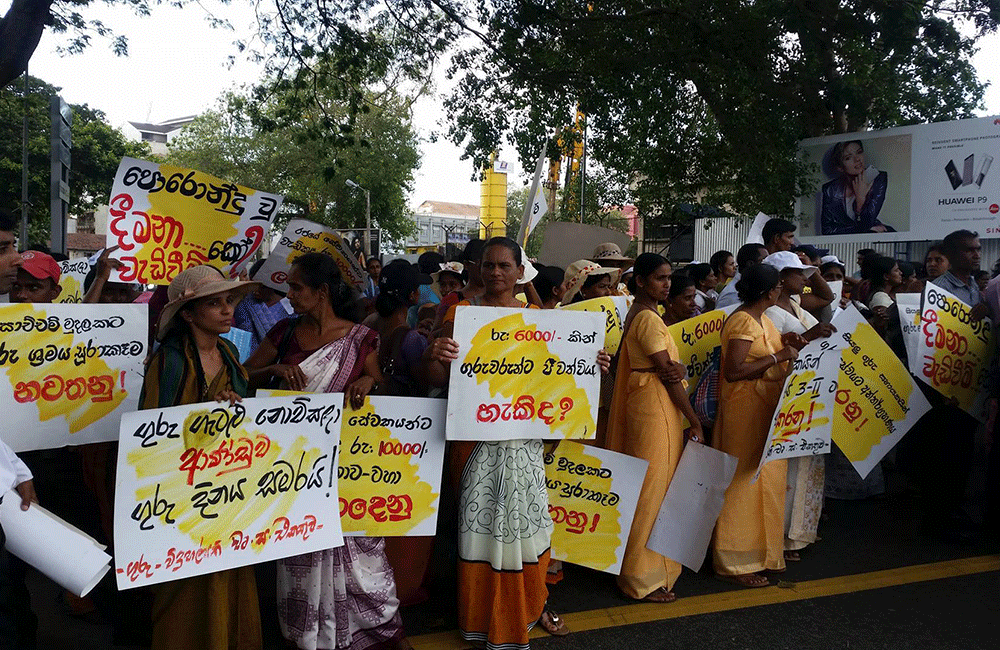
Teachers on strike over detention of protesters
Schools in Sri Lanka remain closed because of the coronavirus pandemic and lessons are conducted online.
Eleven education trade unions say that three union leaders and many others were illegally detained at the quarantine centers after being arrested at protests last week.
They say the leaders and other protesters were pushed inside vehicles and taken away to the quarantine centers as they walked out of courtrooms after having been released on bail.
Meanwhile, the Bar Association of Sri Lanka has also expressed concern that the right to peaceful protests is being violated. (AP)

Fourth judge recuses from Rishad's FR
Justice Mahinda Samayawardena became the fourth judge to recuse himself from hearing the fundamental rights petitions filed by Wanni District Member of Parliament Rishad Bathiudeen and his brother Riyaj Bathiudeen who were both arrested under the Prevention of Terrorism Act (PTA).
The petitions were filed separately seeking the immediate release of the Bathiudeen brothers, and yesterday (05), the case was scheduled to be heard before Justices Murdu Fernando, Achala Vengappuli and Mahinda Samayawardena.
However, Justice Mahinda Samayawardena withdrew from hearing the petitions citing personal reasons.
As a result, the case was rescheduled to be heard before another panel of judges on August 08.
On previous hearings, Supreme Court Justices Janak de Silva, Yasantha Kodagoda and AHMD Nawaz had recused themselves on individual occasions citing personal reasons leading to postponement of hearing the case.
The fundamental rights application made by the Bathiudeen brothers seeks to secure a ruling that their arrest and detention under the PTA was unlawful and that they have no connection to any terrorist activity. Rishad Bathiudeen had also claimed in his petition that the arrests were politically motivated and sought to humiliate the leader of a political party and a minority community.
Commenting on the arrest of Rishad Bathiudeen, SJB Parliamentarian Eran Wickremaratne said that the abuse of the PTA to arrest and detain members of the opposition under the guise of national security was a serious threat to the democratic structure of the country.
He further said that, although his party was not opposed to measures adopted in the interests of national security, the Government had abused the law to arrest Rishad Bathiudeen.
The Chief Opposition Whip Lakshman Kiriella also acknowledged that Rishad Bathiudeen was the only MP to have been arrested and detained under the PTA in the history of Sri Lankan politics.
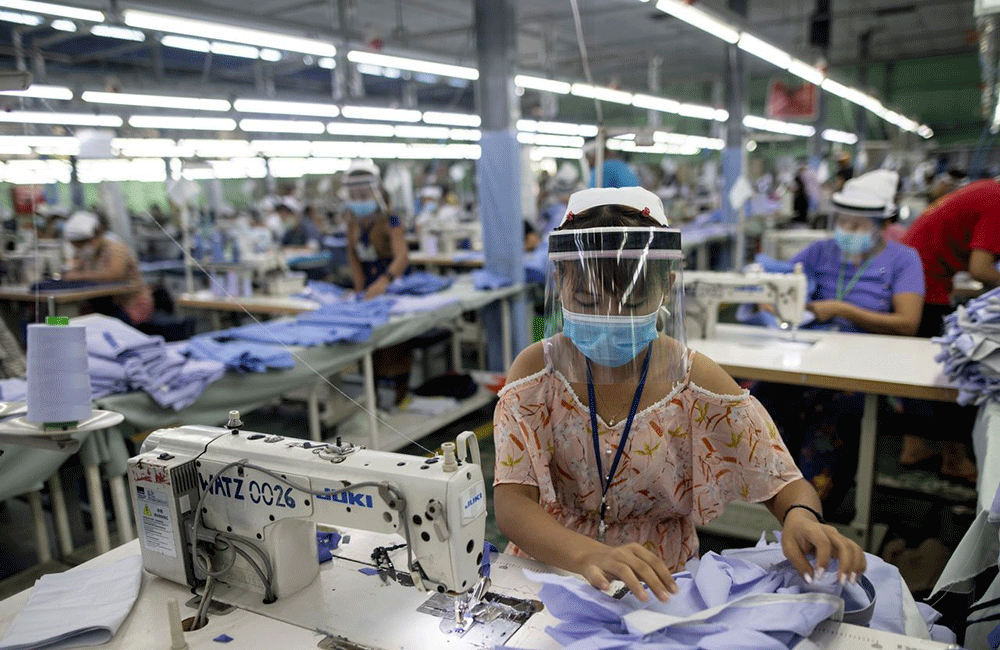
Protect garment workers' rights during pandemic
The Sri Lankan government has used a strict lockdown, first imposed on May 21, 2021, and other measures, including travel bans and bans on public gatherings, to contain a fresh wave of Covid-19 cases.
However, President Gotabaya Rajapaksa ordered garment factories to remain open. Trade unions and public health inspectors have reported numerous virus outbreaks in factories, as well as in the congested boarding houses where many workers live, and alleged that employers were under-testing and under-reporting cases to maintain production levels.
“Sri Lanka’s garment workers are entitled to work in safety and be properly paid even when they fall sick or need to quarantine,” said Meenakshi Ganguly, South Asia director at Human Rights Watch. “The government and employers should fully implement existing agreements and guidelines, be transparent about Covid-19 infections in factories, and provide for workers’ welfare instead of intimidating and silencing them.”
One in seven Sri Lankan women work in the garment sector, according to the International Labour Organization (ILO). There have been repeated outbreaks in garment factories since April. Yet, five labor rights activists from four organizations told Human Rights Watch they have received complaints from workers that factory managers pressured workers to work without adequate occupational health and safety measures.
All five said that numerous workers from different factories complained to them that they lost pay when they fell sick or needed to quarantine. The activists said that the police or military personnel had intimidated them to stop them from speaking out.
Following an October 2020 Covid-19 outbreak in a factory owned by Brandix Lanka Limited, the government made it mandatory for all factories to have a Covid-19 health committee, including management and workers’ representatives. As of early July, people interviewed said, most factories had not established the committees.
On October 25, the Sri Lankan government issued guidelines requiring garment factories to take occupational health and safety measures for ventilation, screening, testing, and isolating infected workers. Labor rights activists have consistently raised concerns in written statements that employers were flouting guidelines, despite government claims that health measures are enforced. “Labor rights are reserved to a piece of paper,” one activist said, adding that workers, “are scared of losing their jobs, so even when they have symptoms they continue to go to work.”
Another labor activist said, “If factories are aware of a positive test, they don’t do anything about it or share the information” with health authorities. An activist who had assisted workers who were sick with the virus said, “The employers are busy with their orders and workers are not given PCR [Covid-19] tests, because if they are positive, they will not be able to employ them in production.”
Many, though not all, garment factories in Sri Lanka are located within industrial areas called Free Trade Zones (FTZs). Systematic data on Covid-19 cases in the garment sector, which contributes 6 percent of Sri Lanka’s GDP and 44 percent of exports, is not available.
On May 20, a court in Galle detained a manager from the Koggala FTZ on charges under the Quarantine and Prevention of Diseases Act, after the manager allegedly concealed information and failed to follow instructions from public health officials following an outbreak in the factory. Although this prosecution was unusual, activists told Human Rights Watch they believed factory violations of quarantine rules are widespread.
In April, police dispersed a workers’ protest outside a factory in Bingiriya, where the management was alleged to have kept staff working despite an outbreak. On July 8, trade unionists were detained at a labor rights protest in Colombo and forcibly taken to a Covid-19 quarantine facility, two days after the government banned public protests on purported public health grounds.
Quarantine facilities are run by the Sri Lankan military, which the government has placed in control of its response to the pandemic. When employees are sent to quarantine facilities, their absence is typically deducted from their annual allowance of 14 days unpaid leave.
Following the major outbreak at a Brandix factory in October, trade unions filed a complaint with the Human Rights Commission of Sri Lanka alleging that soldiers “rounded up” 98 workers in the middle of the night and arbitrarily detained them in an unsanitary quarantine facility. In response, the army accused the complainants of pursuing “hidden plans,” and said the military should not be “insulted or downgraded.” Human Rights Watch wrote to Brandix seeking information about the October outbreak but received no response.
Many factories have hired former army officers in management roles, and their tendency to enforce military-style discipline has “instilled fear” in workers, activists said. One activist said that she was threatened earlier this year by a garment factory manager, a retired army officer, who called her and told her he had “dealt with terrorists” and warned against “raising issues.”
The labor rights activists also reported increased surveillance and intimidation by government security agencies. One woman said military intelligence asked her organization why it had spoken to the international media. Another activist said that members of the police Criminal Investigation Department visited her office in April.
“It’s very risky for anyone to talk about these things,” one activist said. “People are very afraid to speak out,” said another.
The government has also taken formal steps to prevent the sharing of information related to the pandemic. In May, the health secretary, Maj. Gen. Dr. S H Munasing, issued a circular banning health officials from speaking to the media, because they were allegedly sharing “incorrect” information and “criticizing health policies.”
In June, the police issued a statement entitled “circulation of fake news, photographs, videos causing disunity, hate and obstructing the Covid-19 programme.” The Bar Association of Sri Lanka said the powers cited “could be misused by police officers in order to stifle the freedom of speech and expression.”
Security force intimidation of workers is particularly acute in the Tamil-majority north of Sri Lanka, which has remained heavily militarized since the end of the civil war in 2009. In Maruthankerny, security officials reportedly told workers they would lose pay and benefits if they did not report for work, despite safety fears related to the spread of Covid-19.
Most garment workers in FTZs live in crowded boarding houses operated by private landlords. Workers’ representatives said that because people with suspected or confirmed cases of Covid-19 are frequently not placed in isolation but instead sent back to their boarding house, there is a risk of transmitting the virus among workers of different factories who live in the same building.
Many garment workers come from parts of the country different from where their factory is located, so they do not qualify for the Rupees 5000 (US$25) relief packages distributed by local governments to low-income workers whose incomes have been affected by the pandemic.
The government and factory owners should take effective steps to isolate workers who test positive, and ensure that those receiving treatment or in isolation or quarantine receive full pay, Human Rights Watch said. Relief packages should be distributed to workers irrespective of which part of the country they come from, and safety measures and guidelines previously agreed upon with worker representatives should be followed.
Attempts to intimidate or coerce workers and their representatives, attacks on freedom of association, including the right to join a trade union, and attempts to stifle freedom of expression, should be immediately withdrawn. Foreign companies that buy clothes from Sri Lanka, and trading partners, including the European Union, whose GSP+ trading arrangement includes commitments to uphold labor rights, should press Sri Lanka to adhere to its commitments.
International and local labor rights groups from numerous countries have started a campaign for brands to help support workers and shore up social protection systems by joining a Wage Assurance Fund and Severance Guarantee Fund. Brands should support such initiatives, Human Rights Watch said.
Sri Lankan garment manufacturers have applied for loans from the International Finance Corporation (IFC), a part of the World Bank Group. The IFC should rigorously ensure that companies receiving loans adhere to its performance standards on labor and working conditions, and uphold fundamental labor rights enshrined in ILO conventions, including freedom of association and collective bargaining.
“Sri Lankan garment workers don’t just provide for their families, they help to keep the entire economy afloat during these very difficult times,” Ganguly said. “Their safety needs to be protected and their rights respected by the global garment industry that relies on their labor."
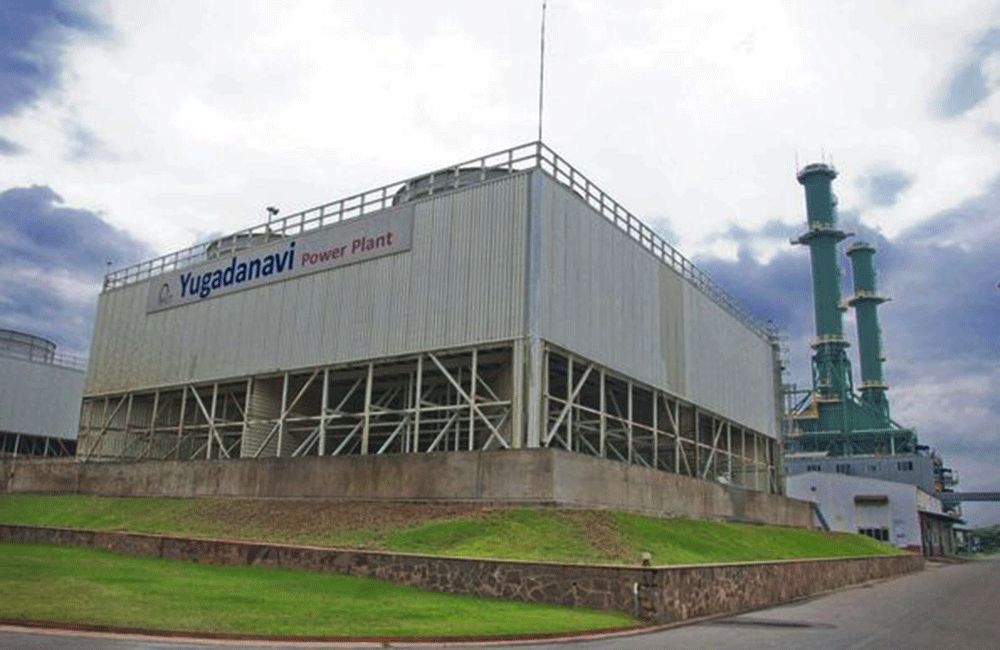
US company to become majority shareholder of Yugadanavi diesel plant
According to the report, the Employees Provident Fund (EPF) owns 23.9 percent of the plants shares and the sale to the American company, New Fortress Energy (NFE), had been rejected by the EPF trustees and therefore, the Government has decided to sell 51% of shares owned by the Treasury.
Page 223 of 533
